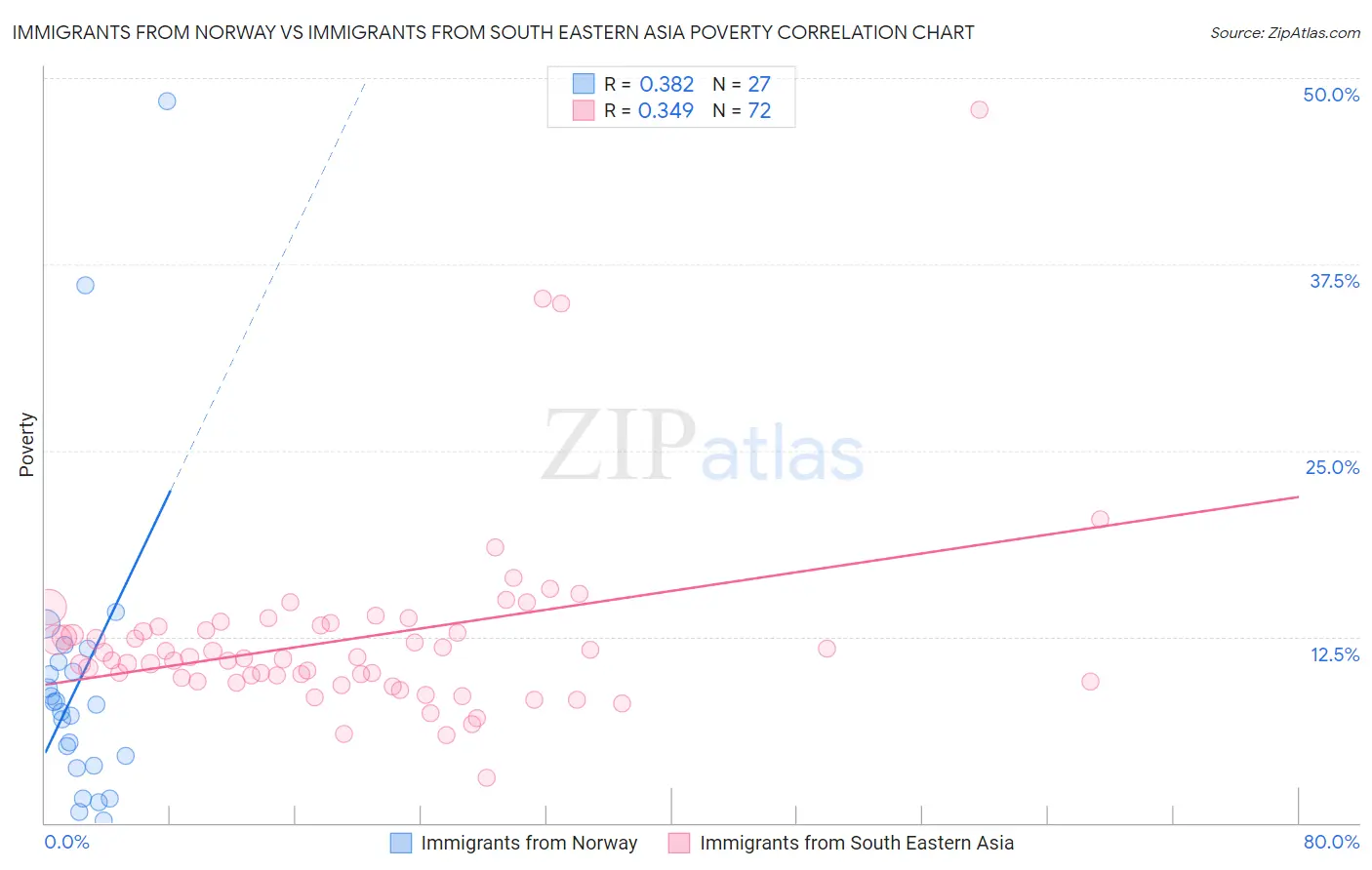Immigrants from Norway vs Immigrants from South Eastern Asia Poverty
COMPARE
Immigrants from Norway
Immigrants from South Eastern Asia
Poverty
Poverty Comparison
Immigrants from Norway
Immigrants from South Eastern Asia
11.7%
POVERTY
88.0/ 100
METRIC RATING
126th/ 347
METRIC RANK
11.7%
POVERTY
88.9/ 100
METRIC RATING
120th/ 347
METRIC RANK
Immigrants from Norway vs Immigrants from South Eastern Asia Poverty Correlation Chart
The statistical analysis conducted on geographies consisting of 116,687,358 people shows a mild positive correlation between the proportion of Immigrants from Norway and poverty level in the United States with a correlation coefficient (R) of 0.382 and weighted average of 11.7%. Similarly, the statistical analysis conducted on geographies consisting of 512,258,667 people shows a mild positive correlation between the proportion of Immigrants from South Eastern Asia and poverty level in the United States with a correlation coefficient (R) of 0.349 and weighted average of 11.7%, a difference of 0.23%.

Poverty Correlation Summary
| Measurement | Immigrants from Norway | Immigrants from South Eastern Asia |
| Minimum | 0.18% | 3.0% |
| Maximum | 48.4% | 47.9% |
| Range | 48.3% | 44.9% |
| Mean | 9.6% | 12.4% |
| Median | 7.9% | 11.1% |
| Interquartile 25% (IQ1) | 3.9% | 9.6% |
| Interquartile 75% (IQ3) | 10.8% | 13.2% |
| Interquartile Range (IQR) | 6.9% | 3.6% |
| Standard Deviation (Sample) | 10.3% | 6.4% |
| Standard Deviation (Population) | 10.1% | 6.4% |
Demographics Similar to Immigrants from Norway and Immigrants from South Eastern Asia by Poverty
In terms of poverty, the demographic groups most similar to Immigrants from Norway are Immigrants from Argentina (11.7%, a difference of 0.020%), Immigrants from Brazil (11.7%, a difference of 0.040%), Soviet Union (11.7%, a difference of 0.080%), Immigrants from Israel (11.7%, a difference of 0.14%), and Immigrants from Hungary (11.7%, a difference of 0.15%). Similarly, the demographic groups most similar to Immigrants from South Eastern Asia are Tlingit-Haida (11.7%, a difference of 0.010%), Argentinean (11.7%, a difference of 0.050%), New Zealander (11.7%, a difference of 0.060%), Puget Sound Salish (11.7%, a difference of 0.060%), and Immigrants from Hungary (11.7%, a difference of 0.080%).
| Demographics | Rating | Rank | Poverty |
| Immigrants | Belarus | 90.8 /100 | #113 | Exceptional 11.6% |
| Immigrants | China | 90.7 /100 | #114 | Exceptional 11.6% |
| Albanians | 90.3 /100 | #115 | Exceptional 11.7% |
| Immigrants | Russia | 89.7 /100 | #116 | Excellent 11.7% |
| Sri Lankans | 89.4 /100 | #117 | Excellent 11.7% |
| Argentineans | 89.1 /100 | #118 | Excellent 11.7% |
| Tlingit-Haida | 89.0 /100 | #119 | Excellent 11.7% |
| Immigrants | South Eastern Asia | 88.9 /100 | #120 | Excellent 11.7% |
| New Zealanders | 88.7 /100 | #121 | Excellent 11.7% |
| Puget Sound Salish | 88.7 /100 | #122 | Excellent 11.7% |
| Immigrants | Hungary | 88.6 /100 | #123 | Excellent 11.7% |
| Soviet Union | 88.4 /100 | #124 | Excellent 11.7% |
| Immigrants | Brazil | 88.2 /100 | #125 | Excellent 11.7% |
| Immigrants | Norway | 88.0 /100 | #126 | Excellent 11.7% |
| Immigrants | Argentina | 88.0 /100 | #127 | Excellent 11.7% |
| Immigrants | Israel | 87.4 /100 | #128 | Excellent 11.7% |
| South Africans | 87.0 /100 | #129 | Excellent 11.7% |
| Immigrants | Ukraine | 86.6 /100 | #130 | Excellent 11.8% |
| French | 86.1 /100 | #131 | Excellent 11.8% |
| Peruvians | 85.6 /100 | #132 | Excellent 11.8% |
| Immigrants | Western Europe | 85.2 /100 | #133 | Excellent 11.8% |